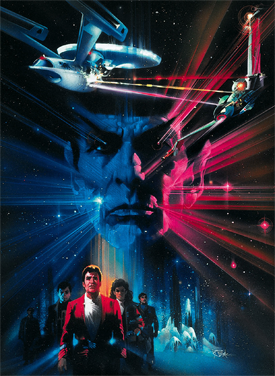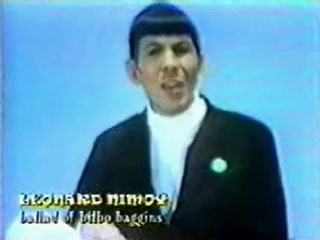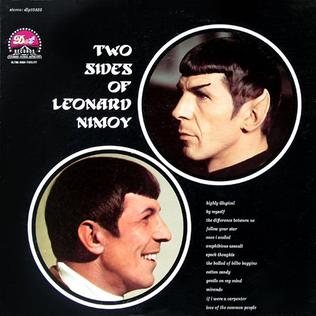Star Trek is an American science fiction television series created by Gene Roddenberry that follows the adventures of the starship USS Enterprise (NCC-1701) and its crew. It later acquired the retronym of Star Trek: The Original Series (TOS) to distinguish the show within the media franchise that it began.

Star Trek: The Animated Series (TAS), is an American animated science fiction television series created by Gene Roddenberry. It originally aired under the title simply as Star Trek, subtitled Created by Gene Roddenberry, on Saturday mornings from September 8, 1973, to October 12, 1974, on NBC, spanning 22 episodes over two seasons. The second series in the Star Trek franchise, it features mostly the same characters as Star Trek: The Original Series. Set in the 23rd century, when Earth is part of a United Federation of Planets, it follows the adventures of the Starfleet vessel USS Enterprise as it explores the Milky Way galaxy.
"Twinkle, Twinkle, Little Star" is a popular English lullaby. The lyrics are from an early-19th-century English poem written by Jane Taylor, "The Star". The poem, which is in couplet form, was first published in 1806 in Rhymes for the Nursery, a collection of poems by Taylor and her sister Ann. It is sung to the tune of the French melody "Ah! vous dirai-je, maman", which was published in 1761 and later arranged by several composers, including Mozart with Twelve Variations on "Ah vous dirai-je, Maman". The English lyrics have five stanzas, although only the first is widely known. It has a Roud Folk Song Index number of 7666.

Vulcans, sometimes referred to as Vulcanians, are a fictional extraterrestrial humanoid species in the Star Trek universe and media franchise. In the various Star Trek television series and films, they are noted for their attempt to live by logic and reason with as little interference from emotion as possible. Known for their pronounced eyebrows and pointed ears, they originate from the fictional planet Vulcan. In the Star Trek universe, they were the first extraterrestrial species to make contact with humans.

Leonard Simon Nimoy was an American actor, famed for playing Spock in the Star Trek franchise for almost 50 years. This includes originating Spock in the original Star Trek series in 1966, then Star Trek: The Animated Series, the first six Star Trek films, and Star Trek: The Next Generation. Nimoy also directed films, including Star Trek III: The Search for Spock (1984) and Star Trek IV: The Voyage Home (1986), and appeared in several films, television shows, and voice acted in several video games. Outside of acting, Nimoy was a film director, photographer, author, singer, and songwriter.

Spock is a fictional character in the Star Trek media franchise. He first appeared in the original Star Trek series serving aboard the starship USS Enterprise as science officer and first officer and later as commanding officer of two iterations of the vessel. Spock's mixed human-Vulcan heritage serves as an important plot element in many of the character's appearances. Along with Captain James T. Kirk and Dr. Leonard "Bones" McCoy, he is one of the three central characters in the original Star Trek series and its films. After retiring from active duty in Starfleet, Spock served as a Federation ambassador, and later became involved in the ill-fated attempt to save Romulus from a supernova, leading him to live out the rest of his life in a parallel universe.

Star Trek III: The Search for Spock is a 1984 American science fiction film, written and produced by Harve Bennett, directed by Leonard Nimoy, and based on the television series Star Trek. It is the third film in the Star Trek franchise and is the second part of a three-film story arc that begins with Star Trek II: The Wrath of Khan (1982) and concludes with Star Trek IV: The Voyage Home (1986). After the death of Spock (Nimoy), the crew of the USS Enterprise returns to Earth. When James T. Kirk learns that Spock's spirit, or katra, is held in the mind of Dr. Leonard "Bones" McCoy, Kirk and company steal the decommissioned USS Enterprise to return Spock's body to his homeworld. The crew must also contend with hostile Klingons led by Kruge who are bent on stealing the secrets of a powerful terraforming device.
"The Cage" is the first pilot episode of the American television series Star Trek. It was completed on January 22, 1965. The episode was written by Gene Roddenberry and directed by Robert Butler. It was rejected by NBC in February 1965, and the network ordered another pilot episode, which became "Where No Man Has Gone Before". Much of the original footage from "The Cage" was later incorporated into the season 1 two-parter episode "The Menagerie" (1966); however, "The Cage" was first released to the public on VHS in 1986, with a special introduction by Gene Roddenberry, and was not broadcast on television in its complete form until 1988. The black and white version and shorter all-color version was also released in various standard-definition media including LaserDisc, VHS, and DVD formats.

Christine Chapel is a fictional character who appears in all three seasons of the American science fiction television series Star Trek: The Original Series, as well as Star Trek: The Animated Series and the films Star Trek: The Motion Picture and Star Trek IV: The Voyage Home. Portrayed by Majel Barrett, she was the ship's nurse on board the Starfleet starship USS Enterprise. A younger version of Chapel appears in the 2022 series Star Trek: Strange New Worlds, portrayed by Jess Bush.

In the fictional Star Trek universe, the Vulcan nerve pinch is a technique used mainly by Vulcans to render unconsciousness by pinching a pressure point at the base of the victim's neck.

The Menagerie, Parts I and II, are the eleventh and twelfth episodes of the first season of the American science fiction television series, Star Trek. Written by series creator Gene Roddenberry and directed by Marc Daniels and Robert Butler, it is the only two-part story in the original series. Part I was broadcast by NBC on November 17, 1966, and Part II was broadcast on November 24, 1966. In the episode, Spock abducts his former commander Christopher Pike, locks the Enterprise on a course to the forbidden planet Talos IV and turns himself in for court-martial where he presents an elaborate story explaining his actions.

"The Ballad of Bilbo Baggins" is a song composed by Charles Randolph Grean and performed by Leonard Nimoy, telling the story of Bilbo Baggins and his adventures in J. R. R. Tolkien's 1937 novel The Hobbit. The recording was featured on the 1968 album Two Sides of Leonard Nimoy, the second of Nimoy's albums on Dot Records. It was also released as a single in July 1967, backed with a "modern thought-image" folk song called "Cotton Candy".

The discography of American actor Leonard Nimoy consists of 5 studio albums and 4 compilations.

Two Sides of Leonard Nimoy is Leonard Nimoy's second album released shortly after Music from Outer Space. It was released in early 1968 by Dot Records and reached 97 on the US album chart.

The Way I Feel is the third studio album by Leonard Nimoy. It was released in late 1968 by Dot Records, the same year Two Sides was released.

The Touch of Leonard Nimoy is the fourth studio album released from Leonard Nimoy. The album was released in 1969, on Dot Records.
Star Trek: Planet of the Titans, also known as Star Trek: Planet of Titans, is an unproduced film based on Star Trek, which reached the script and design phases of pre-production. Following the success of Star Trek in broadcast syndication during the early 1970s and the popularity of the series at science-fiction conventions, Paramount Studios made several attempts to produce a feature film based upon the series. In 1975, Star Trek: The God Thing was proposed by franchise creator Gene Roddenberry but was not picked up by the studio.

The development of Spock, a fictional character first introduced in the American science fiction television series Star Trek, began prior to the start of the series. The first known mention of Spock was in a discussion between Gene Roddenberry and Gary Lockwood, where the latter suggested Leonard Nimoy for the role. Roddenberry agreed with the suggestion, and Nimoy became the first choice actor for the part. However, Roddenberry was required to audition other actors for the role. It was offered to both DeForest Kelley and Martin Landau before Nimoy. Nimoy disliked the prosthetic ears he was required to wear, and there were concerns from the studio that they made him appear satanic. Roddenberry fought to keep the character in the second pilot, "Where No Man Has Gone Before" after the rest of the main cast was dropped from the initial pilot, "The Cage".















